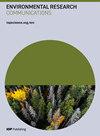Impact of global warming on labor productivity in the Chengdu-Chongqing economic circle, China
IF 2.9
4区 环境科学与生态学
Q3 ENVIRONMENTAL SCIENCES
引用次数: 0
Abstract
In recent years, the Chengdu-Chongqing Economic Circle (CCEC) has experienced frequent heat events, significantly impacting labor productivity. The CCEC is an important economic growth pole in western China. Therefore, an in-depth study of the impact of heat stress on labor productivity holds great significance for climate change adaptation and enhancing economic efficiency. Based on the relationship between the wet-bulb globe temperature (WBGT) and labor productivity of different industries, the labor productivity loss caused by heat in the CCEC was estimated using the observation data of the meteorological station and the projection results of the BCC-CSM2-MR model from the Coupled Model Intercomparison Project Phase 6 (CMIP6). The results showed that the impact of heat on the labor productivity of different industries in the CCEC mainly occurs from June to August, with the largest impact on agriculture, followed by industry, and the smallest impact on service sectors. Losses from heat stress to labor productivity in agriculture, industry, and services showed a significant increasing trend from 1980 to 2020 but a decreasing trend in comprehensive labor productivity loss. From 2020–2100, labor productivity losses in different industries due to heat stress show an increasing and then decreasing trend in the low emissions scenario, productivity losses in the medium emissions scenario are characterized by an increasing and then sustained change, and labor productivity losses in the high emissions scenario show a sustained increasing trend from 2020. By the end of the 21st century, the increase in labor productivity losses across different industries under the high emission scenario is approximately 15%–23%, and the large value center shifts slightly to the west. In most areas, the losses of agricultural, industrial, service, and comprehensive labor productivity exceed 45%, 32%, 20%, and 24%, respectively.全球变暖对中国成渝经济圈劳动生产率的影响
近年来,成渝经济圈(CCEC)高温天气频发,严重影响了劳动生产率。成渝经济圈是中国西部重要的经济增长极。因此,深入研究热应激对劳动生产率的影响,对适应气候变化、提高经济效益具有重要意义。基于湿球温度(WBGT)与不同行业劳动生产率之间的关系,利用气象站观测资料和耦合模式相互比较项目第六阶段(CMIP6)BCC-CSM2-MR模式的预测结果,估算了高温对CCEC地区劳动生产率造成的损失。结果表明,高温对 CCEC 地区各行业劳动生产率的影响主要发生在 6 月至 8 月,对农业的影响最大,其次是工业,对服务业的影响最小。从1980年到2020年,高温对农业、工业和服务业劳动生产率的损失呈显著上升趋势,但综合劳动生产率损失呈下降趋势。从 2020 年到 2100 年,在低排放情景下,不同行业因热应力造成的劳动生产率损失呈现先增加后减少的趋势,在中排放情景下,劳动生产率损失呈现先增加后持续的变化,而在高排放情景下,劳动生产率损失从 2020 年开始呈现持续增加的趋势。到 21 世纪末,在高排放情景下,不同行业的劳动生产率损失增幅约为 15%-23%,大的价值中心略微向西部转移。在大多数地区,农业、工业、服务业和综合劳动生产率的损失分别超过 45%、32%、20% 和 24%。
本文章由计算机程序翻译,如有差异,请以英文原文为准。
求助全文
约1分钟内获得全文
求助全文

 求助内容:
求助内容: 应助结果提醒方式:
应助结果提醒方式:


